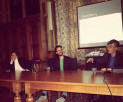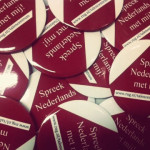First international candidate debate
SOG’s Jonah Thompson (England), Lijst Calimero’s Boris Kyuchoukov (Bulgaria) and Lijst Sterk’s ‘Jacky’ Yuejie Wang (China) engaged in a polite and often humorous battle in the Senate Room. The international candidate debate covered six topics – language, employability, education, housing, student life and facilities – and was moderated by discussion leader Erica Duffy (20) of The European International Model United Nations (TEIMUN).
When it came to the topic of education, Wang, relying on self-deprecation, described his English as ‘still crappy’ and called upon his experience as a student at University College Groningen both to explain how he wound up in this position as well as to emphasise Lijst Sterk’s preference for small-scale education, such as learning communities, personalised classes and modern teaching styles like gamification.
‘You have to say something!’
‘When I came here, I was a shy boy like all Chinese people’, he said. ‘I never talked. But here I am, standing in front of you, doing the public speaking. I learned that in my small-scale learning community. When only five people are debating, you have to say something!’
SOG’s Thompson took a more liberal approach. ‘There is no one-size-fits-all programme in education’, he said. ‘You cannot impose learning communities on every student. We’re all different. Also, a lot of self-development happens outside the classroom walls. A university should not force students into a box.’
On the subject of university language policy, Wang proposed pairing internationals with Dutch speakers who want to learn another language. Calimero’s Kyuchoukov called for Dutch-speaking teachers to improve their English, for Dutch courses to be free in all three years and, in agreement with SOG, for the further improvement of those courses.
‘Why not make it international?’
On the issue of transparency at the university, Kyuchoukov said, ‘It’s important that the University Council and the university in general put out documents in Dutch and English so that students become more acquainted with policies. One slight point of disagreement with SOG: we don’t see English as the only language to be the output of these documents. In some places, English is not really relevant.’ According to Kyuchoukov, Calimero stands for the implementation of English at the RUG only occurring where it is necessary.
In response, Thompson said, ‘You say that I disagree that Dutch should also be a functional language, but I’m in the Netherlands. I think all internationals here respect that they’re going to get a little Dutch with that. But why not make it international as well? Internationalisation doesn’t mean abolition of the culture that this already is. This isn’t imperialism, this is development, progression.’ Additionally, he called for the language minors for students from outside of the arts faculty to be brought back.
Housing
When addressing housing, Wang proposed the creation of a student housing database for both Dutch and international students, joking about Chinese housemates preparing traditional dishes for their housemates every day. Thompson wondered if his lack of culinary ability as an Englishman would become a liability in such a housing market.
Kyuchoukov chose instead to focus on Calimero’s goal of working together with the university and housing agencies that provide good, affordable housing. ‘That way, not everyone has to go to SSH and find this horrible house. Also, international students are now deprived of their right to reduce the price for a bad quality house. That should be changed.’ Thompson conceded that the housing issue seems ‘almost unsolvable, but in the process of changing.’ SOG provides legal aid for matters like mediation costs and dodgy landlords.
When it comes to employability, the three parties are more or less on the same page: NEXT should become more effective. Wang proposed developing a database for that as well, listing job opportunities for non-Dutch speakers, while Kyuchoukov called for NEXT to collaborate with local government. Thompson cited feedback from the SOG employability survey, focusing on the call for an effective online ‘employability bank’.
After an extensive questions round, Duffy wrapped up the evening by expressing her hopes that the audience has gathered enough information to make an ‘educated guess ‘ – she laughed – ‘I mean, vote.’






